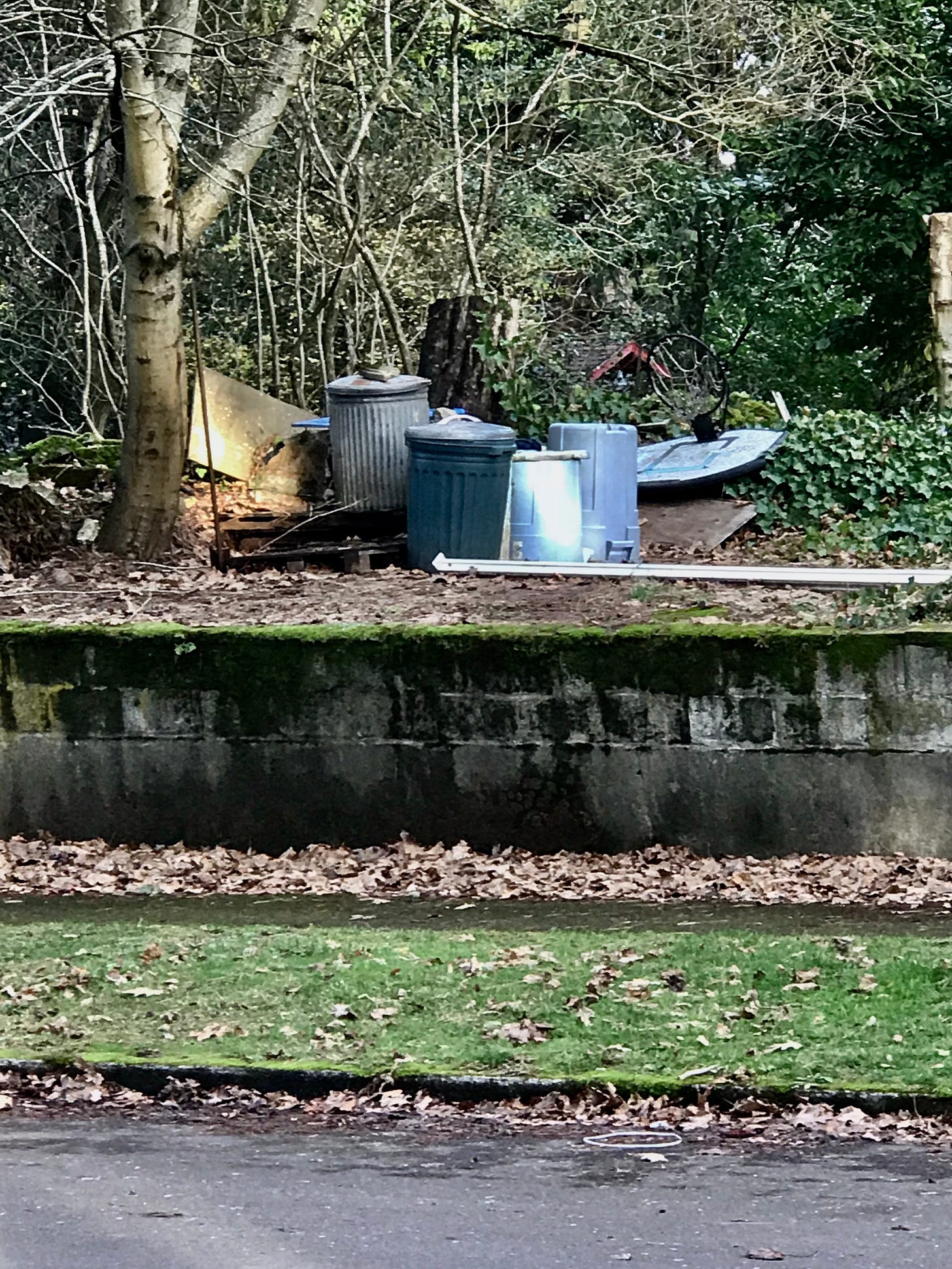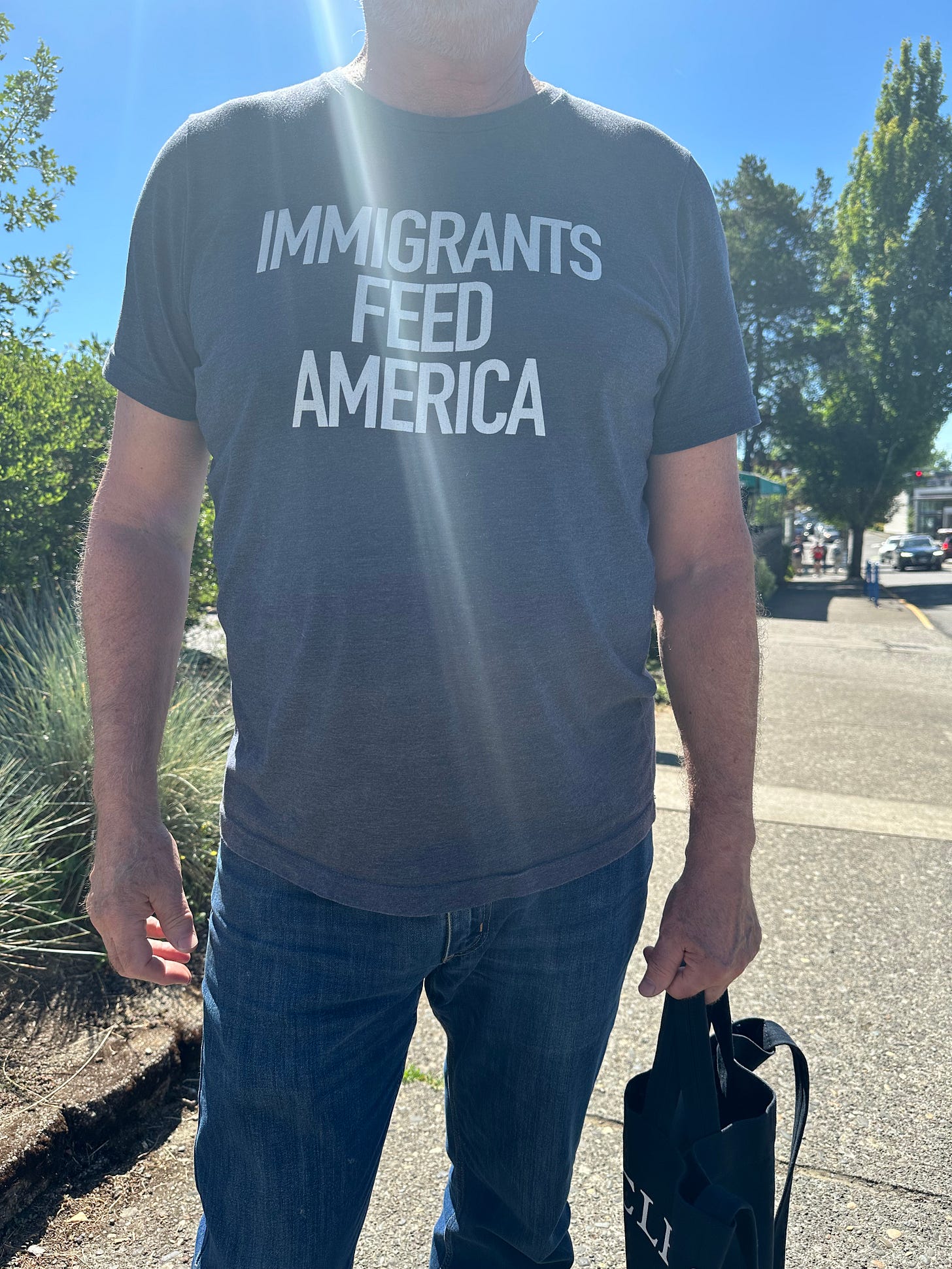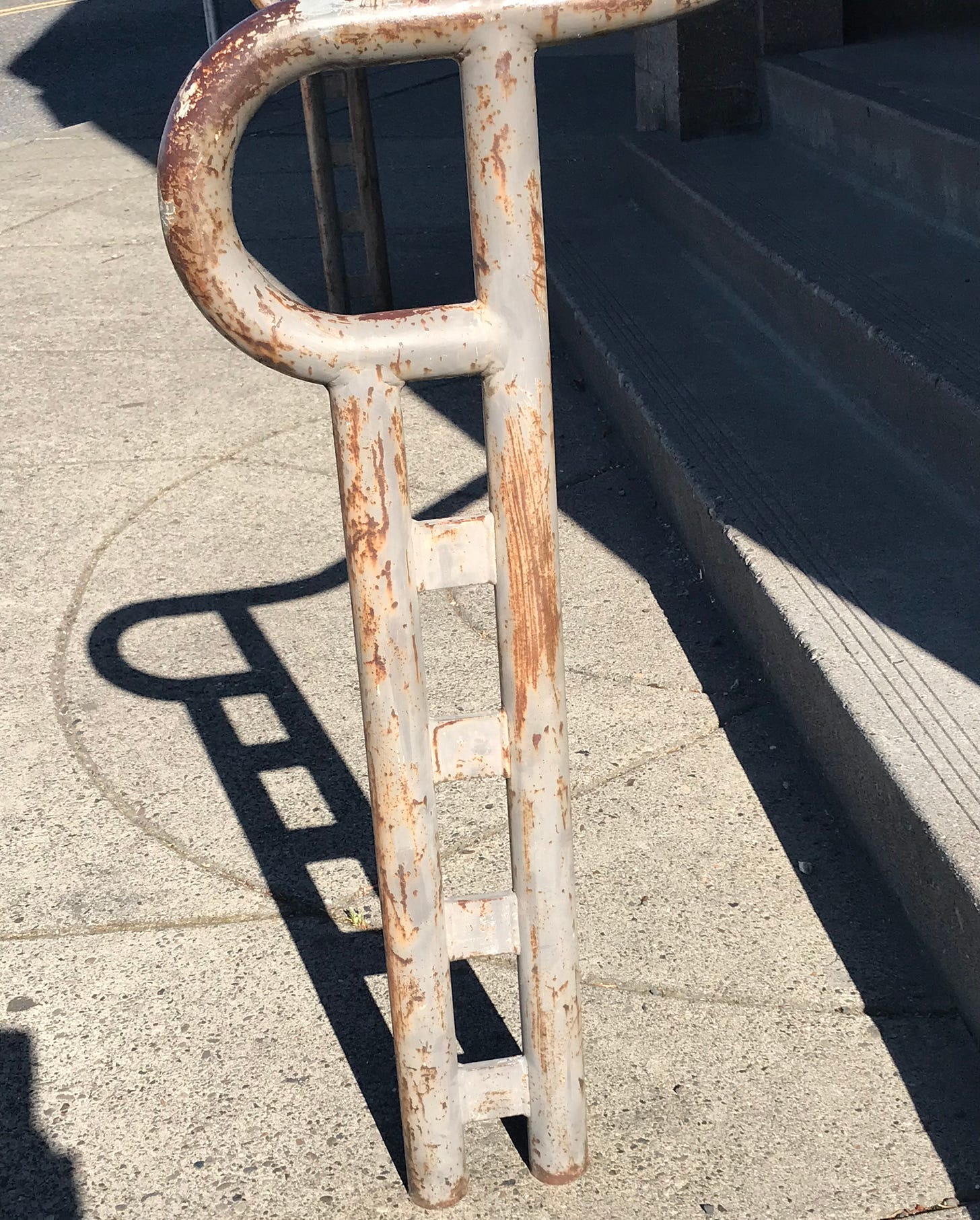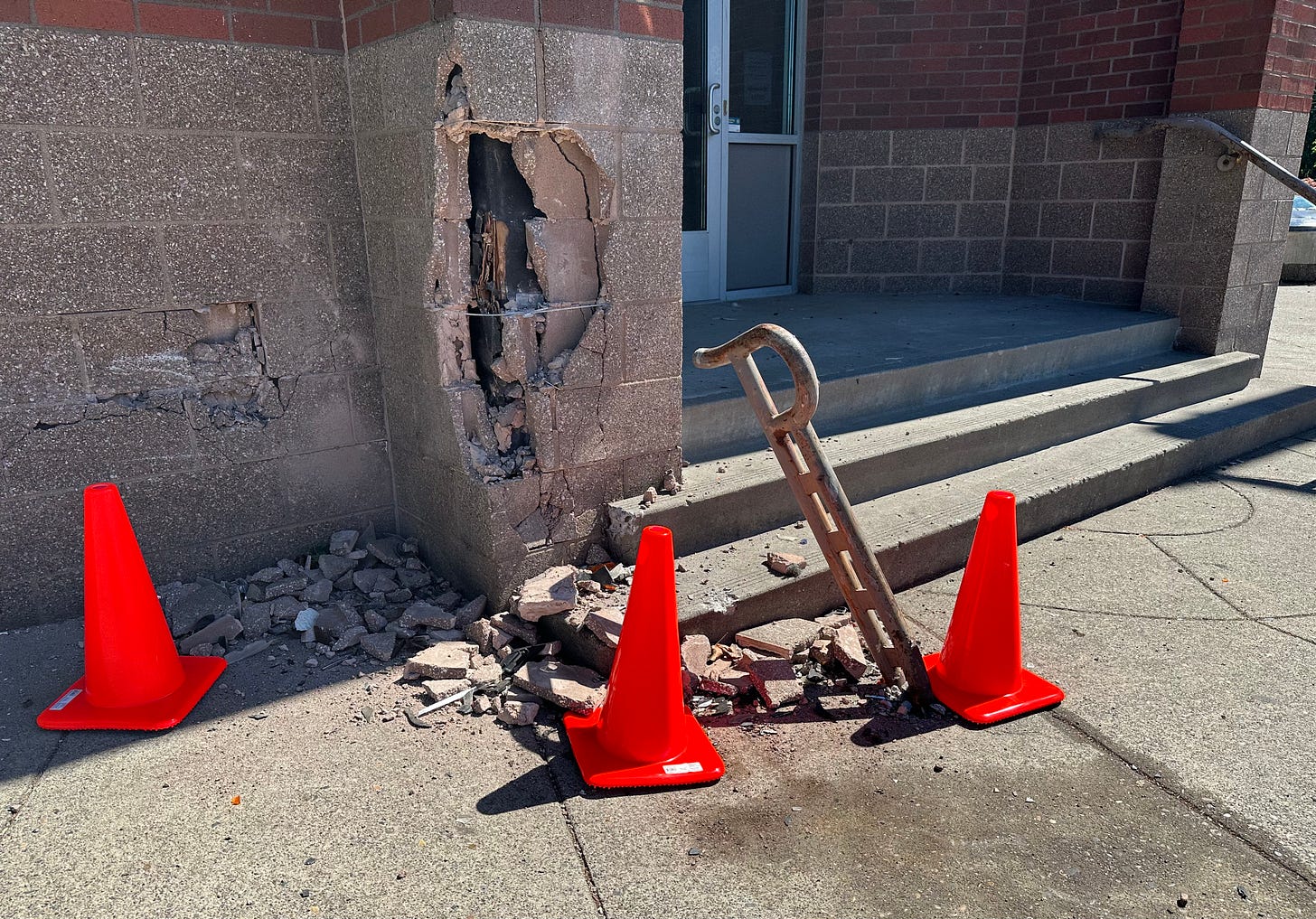A gift from the Universe
I’ve never found a feather as colorful as this. It may be from a northern flicker, one of the dozens of birds the (free!) Merlin Bird ID app from the Cornell Lab of Ornithology has identified near where I live.
I was returning from a meeting at about 8 in the evening when this feather appeared on the sidewalk in front of me. The pavement was clear; the leaf blowers had scoured it earlier that day. Nothing but bare concrete and a bright orange feather.
I choose to think serendipitous findings like this have meaning.
Check in
Three words
Suffering
Healing
Redemption
These are big words. Hard concepts.
Suffering
We don’t want it. We all experience it. We pray for it to end. We try to ignore it, or rise above it. We grapple with it.
Finally, finally, we accept it. That’s cold comfort, acceptance. But it’s better that than the nightmare of no release.
Healing
Healing is the best outcome of suffering. Sometimes, with great effort, we heal ourselves. Sometimes healing comes to us.
I have to keep reminding myself that healing is not the same as a cure. I’ve worked hard over years on the healing part of MS. I’m at peace with the disease. I don’t want it, but I accept it.
But a cure. Wow! If only, if only.
Redemption
How do we redeem ourselves? The hard way. It’s always the hard way.
We begin and end by shedding our egos. Or, alternatively, strengthening them. When your ego isn’t in the way, or it is so strong it doesn’t care, then you can blossom into the divinity that is your birthright.
Then you recognize in yourself the eternal child, eternally innocent, an empty page ready to accept the inscription of the Universe. You are open. You are free.
At some point, with your ego shed like a snake’s skin, you realize your freedom. The storm clouds clear. And you see that gaining it was easy. You pull it into your heart.
And then. And then.
We suffer again.
We heal again.
We seek redemption.
Walking
I miss walking. Before I was diagnosed with MS in the mid- 90s, walking was my favorite exercise. Aerobics was a bust, and I was never a swimmer. But walking was—is, to today’s limited extent—my great joy.
Solitude
Meditation
Discovery
What a trifecta!
One foot, then the other
When you have to think about every step, as I do, walking is trancelike. You notice everything, but in a calm, Zenlike way. Even garbage cans have their own aura.

How it all fell out
My diagnosis was in the mid-90s. On January 1, 2000, I started using a cane. At John Helmer, a Portland haberdashery, I bought a brave green cane with a derby handle, shaped like a pi—π. I’ve written poems about the Lady with the Green Cane.
Eventually, when declining balance dictated, I bought its twin online so I had one for each hand. But I was only using one when, in 2006, I fell and broke my left elbow. After that, I started using a walker.
I bought my first mobility scooter not long after, but used it rarely when I was living at home, as it lived in a shed and was a pain to charge.
Instead, I would use the two green canes to walk to the car, drive somewhere new, wrestle a walker out of the backseat, and explore.
The eight-block rule
For a decade and more, a walk with my walker was about eight blocks maximum. Eventually that dwindled to four blocks, a rest with coffee, then four blocks back. The Coava Coffee store on Southeast Hawthorne was convenient for this strategy.
All over the city
However I walked, I found solace, inspiration, insight and joy.
When I was still driving, I’d go to a new Portland neighborhood,* park, and walk.
I remember climbing all over the West Hills of Portland, then blossoming out into the flatter environs east of the Willamette river. I would plan my walk to end at a coffee shop, where I’d have a cappuccino and a pastry.
*I was going to say unfamiliar part of Portland, but I know this city like a cabbie before GPS, thanks to my job at the newspaper, my children going to magnet schools across town, and my natural curiosity for finding new places.
That was then
I miss those walks. Sometimes the Trimet Lift bus passes through an area where I walked, and memories come flooding back.
Now my walking is reduced to taking my walker from my apartment to the dining room. Counting the steps, I figure it’s about two blocks. I can only do it once a day, as my arms get sore from leaning on its frame.
Regrets?
My life would be so different if I could walk as I did until my mid-40s.
Nature trails—But there’s a half-mile paved track in the woods at RSM.
Travel—But even offsetting my not driving, using jet fuel seems too profligate as the earth wheezes and warms.
Dancing. Who’s to stop me from shaking the top of my body? I’m pretty limber from the waist up.
Enough justification! I would be able to stride across a room and get up from a chair without having to find a handhold. I could push a shopping cart to add food, not as an in-store walker.
I would be able to play volleyball (which I hate) and soccer. Shoot baskets.
I could run to catch a bus.
I could run after errant grandchildren.
And most important: I could walk and walk and walk. All over town. On forest trails. By the side of the road. On the beach.
No doubt. Walking would be good.

The booby prize
Well, I’m not doing those walky things. Not right now. But I have the other skills, insights and gifts that frustrated walking has brought me.
For starters, I’ve had plenty of time to note minute details, many of which I’ve shared with you over the months. Like those garbage cans above.
Some perks of being disabled
Priority boarding on airplanes. Also, better seat assignments and the use of the toilet in first class.
People open doors for you. A double benefit: you don’t have to struggle with the door, and someone gets to feel good about helping you.
Free parking! Well, not anymore. It used to be one could park for free in metered spaces in Portland with a disabled pass. But so many people abused it that the city went back to one dedicated handicapped space per block.
Close-in parking at stores, hospitals, sports venues . . .
Snappy Mart Karts to ride in stores. Many are not plugged in often enough, and they often die in the middle of the store. Clerks are helpful.
Good seating in theaters.
Multnomah County Library Outreach will send books for free to anyone who has trouble getting to a library.
But do they make up for . . .
Long, long ramps—fine for power chairs but a chore for walkers or manual wheelchairs
Missing curb cuts. Go back to where you started.
Being invisible. Disability makes people uncomfortable, so they blank you out.
Exhaustion and frustration from having to backtrack.
Dismal disabled toilets, sometimes too small to accommodate your equipment.
Abled-bodied people hogging handicapped spaces. The worst is an ambulatory person taking a dump in that big disabled toilet cubicle.
Broken pavement
Broken pavement
Did I mention broken pavement?
Sunday stories
Most Sundays, I take a Trimet bus to Hillsdale, just a few miles up the highway from where I live. I’ve harvested many ideas from the farmers market in the Ida B. Wells High School parking lot, and from the Hillsdale Library, one of the prettiest buildings in the Multnomah County Library system.
Eat the paper
Last week, I asked a librarian there if the paper the checkout and hold receipts are printed on is recyclable.
Sure, he said. The papers “are totally BPA-free. I’ve heard you can even eat them.”
“Thanks,” I reply. “I’ll remember that when things totally fall apart.” (Which, considering the state of presidential politics, could happen.)
And he should know. I just happened to ask David Rebal, the Hillsdale Library environmental team representative. There’s one assigned to each of the 18 branch libraries, plus a big team, six or seven, at the Central Library.
One of the environmental team members, Rebal says, came up with the BPA-free paper idea, and the library adopted the solution.
More reasons to love
The library took care of me today. The bathroom was clean and easy to use, and the self-checkout machine reminded me I had a book to pick up from the hold shelf.
And finally, on my way out, an older couple stepped back to hold both the double doors wide (the auto button opens only one door). I glided through with lots of room on either side. Good feelings all around.
Immigrants

On the sidewalk outside, I stopped a man to ask if I could take a picture of his T-shirt, which read “Immigrants Feed America.” Joseph Readdy (“reedy,” not “ready”) agreed.
The back of his shirt had stats from Modern Farmer:
72 percent of U.S. farmworkers are immigrants.
Half of them are undocumented
Build a wall . . . and break our food system
At its website, Modern Farmer describes its purpose:
Modern Farmer is a nonprofit initiative dedicated to raising awareness and catalyzing action at the intersection of food, agriculture, and society. Through storytelling, community building, and partnerships, we educate, inform, and drive positive change in the interest of a more resilient and equitable food system in North America.
The organizers believe in healthy plants growing in healthy earth. Not the postwar “agribusiness” that favors chemicals over nature.
Broken
A few weeks ago, I took a photograph of a railing. I liked its unusual configuration and the pattern of the corrosion. It has a companion, which recently was ripped from the building. It looks as if a car struck it. Or a demon with a sledgehammer.
The building, which used to house a real estate concern, is empty. A call to the management company was not returned.
The damage is hardly worth mentioning. Except that the violence done to this building is somehow shocking. How can it be fixed?
News from up north
Minnesota may be frozen in the winter, but it’s hot and humid in the summer. I know this from experience.
For other northern news, there’s the Rainy Lake Gazette. In a recent “Ask a Trooper” column, the question is “when I take my (driver’s license road) test, can I take my dog along with me?” And Sgt. Jesse Grabow is ready with the answer we all know is coming, which is “no.”
A poem
Dreams
Horses on bright grass Canoes on a quiet lake Fish jump for berries Birds hop And the young man— Always a youth— Greets me with a nod. The private landscape The city with lighthouse towers The orderly fields by the road Trees like spiny arrows Come away with me Come now The honey is at the lip The bubble swells Your lips against mine The scent of cloves and chocolate Fingers trace The pattern of our future Burlap and red thread Again, again A child’s embroidery, Push the big needle through. Buy the baby some yarn Don’t go. Don’t go. Squirrel in a tree Downward facing squirrel What has he to tell me? That the babies are safe? Sunlight forever Even through clouds Gray sky, wisps of blue Breakers breaking through.
Check out
Please be writing. Open the linen closets of your psyche and shake out those mildewed sheets of thoughts, feelings and impression. Hang them on a line where they can flap in the cleansing breeze and soak up the warm, healing sun.
Kiss away suffering; welcome redemption.
It’s all in your pen, in your fingers, on the page or under the cursor.
Writing is the ultimate act of self-love. Just 20 minutes a day to redemption.
Coming up
More about bundles and barriers.
Bundles is the catch-all term I used when collecting recipes. They are anything that is stuffed. Empanadas, pierogi, won tons, ravioli. Looking forward to sharing the categories and a recipe or two with you.
Barriers is a big subject. Disability makes one hyper-aware of how hard it is to access—all kinds of things. The Americans with Disabilities Act (ADA) is a start. But a panacea? Not hardly.
Today’s disability lists are just an appetizer.
Back to bundles
I’m planning on using a recipe. How do folks feel about that?
Of course, the way I structure Becoming, with snippets of prose and plenty of subheads (“subheds” to all you journalists out there), makes it easy to skip the stuff that doesn’t interest.
So, I just answered my own question. Recipes it is.
Hasta la vista, baby!
Till next week, some clichés and other words to live by
Hang in there
Keep the faith
Don’t stop thinking about tomorrow.
Keep on truckin’.
Be excellent to each other,
And party on, dudes!
—30—











Two quotes in the book we are reading at the manor book club the first is from Russeau there is something in walking that stimulates an enlivens my ideas I can hardly think at all if I stay still my body has to be on the move to set my mind going
The second from Wordsworth to Muse, to creep to halt as well to gaze
My nephew lost his body by falling off a mountain while rappelling at age 19. Since then, he graduated from college, worked for his father's real estate firm as a computer programmer and designed a mapping system that links dots on a map to descriptions of houses for sale. I don't know if this was THE system that has been adopted for use by real estate companies all over the place, but I'm proud as he is of this accomplishment. That was when he was able to move enough to drive a vehicle. Now he can only drive his chair by tipping his head against a ring to steer it. The chair times out, so if he doesn't move after awhile, the chair turns off. He needs someone to turn it back on again. I hope he's never alone for long. It's amazing how much he's been able to do despite his conditions. Notice I didn't use the word "disability?" He's lost faculties, but he's not disabled. I hate that word. It puts a ring around people that limits their self-concepts. (As you can tell, Fran, I'm on a rag today. Sorry.)